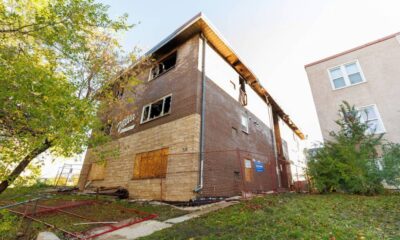Politics
Manitoba Falls Short on Child-Care Spaces Amid National Promise

Manitoba has only created a small fraction of the 23,000 child-care spaces promised under the national $10-a-day child-care program introduced in March 2021. A recent report from the Canadian Centre for Policy Alternatives (CCPA) reveals that just 3,408 spaces have been established for infants and preschoolers since 2022, highlighting significant shortcomings in the province’s child-care strategy.
The $1.2 billion agreement between the province and the federal government aimed to develop these spaces by the end of the fiscal year 2025-26. Despite claims from the provincial government of having created 4,300 spaces for children under seven, discrepancies in reporting have emerged. Economist David Macdonald, who authored the CCPA report titled “Cash Cow: Assessing Child Care Space Creation,” states that the province has utilized a restrictive definition of children who are not yet in full-time school, leading to inflated numbers.
Challenges Facing Child-Care Expansion
The report argues that only 3,408 licenses have been awarded to verified child-care providers since 2022. Macdonald emphasizes the need for urgent government action to increase the number of available spaces. “Non-profit expansion is essential, as it ensures that public funding is directed towards child-care costs rather than enriching for-profit centers,” he explained in an email.
According to Molly McCracken, Manitoba director of the CCPA, the primary expenses in child care include labor and rent. She pointed out, “If a profit is made, it comes at the expense of either of these.” In Manitoba, approximately 95 percent of child-care centers operate as non-profit organizations, allowing funding to be used for better wages and higher-quality care.
Looking ahead, provinces are expected to submit detailed plans to the federal government outlining how they will create additional child-care spaces. McCracken urged that these plans should prioritize the establishment of new publicly owned centers, emphasizing collaboration with Indigenous governments, regional health authorities, and existing non-profit providers. “They need to be pushed to step up and support the creation of new centers to get us back on track,” she stated.
The Impact of Shortages on Families
If the current child-care space shortages are not addressed, the integrity and success of the national $10-a-day child-care system may be severely compromised, according to McCracken. “Parents will continue to struggle to find affordable child-care spaces, which hinders labor-force participation and stifles productivity,” she warned.
In May 2023, the Manitoba government, in conjunction with the federal government, announced a new wage grid for the early learning and child-care sector, providing historic raises of up to $5 per hour. While this wage increase is seen as a crucial step for recruitment and retention within the sector, McCracken noted that the recent study did not assess how these pay raises would address staffing shortages effectively.
The need for immediate action is clear. As Manitoba continues to grapple with the challenge of expanding accessible and affordable child-care options, the focus on sustainable growth within the sector will be critical to meeting the needs of families across the province.
-

 Politics4 weeks ago
Politics4 weeks agoSecwepemc First Nation Seeks Aboriginal Title Over Kamloops Area
-

 World5 months ago
World5 months agoScientists Unearth Ancient Antarctic Ice to Unlock Climate Secrets
-

 Entertainment5 months ago
Entertainment5 months agoTrump and McCormick to Announce $70 Billion Energy Investments
-

 Science5 months ago
Science5 months agoFour Astronauts Return to Earth After International Space Station Mission
-

 Lifestyle5 months ago
Lifestyle5 months agoTransLink Launches Food Truck Program to Boost Revenue in Vancouver
-

 Technology3 months ago
Technology3 months agoApple Notes Enhances Functionality with Markdown Support in macOS 26
-

 Lifestyle3 months ago
Lifestyle3 months agoManitoba’s Burger Champion Shines Again Amid Dining Innovations
-

 Top Stories2 months ago
Top Stories2 months agoUrgent Update: Fatal Crash on Highway 99 Claims Life of Pitt Meadows Man
-

 Politics4 months ago
Politics4 months agoUkrainian Tennis Star Elina Svitolina Faces Death Threats Online
-

 Sports5 months ago
Sports5 months agoSearch Underway for Missing Hunter Amid Hokkaido Bear Emergency
-

 Politics5 months ago
Politics5 months agoCarney Engages First Nations Leaders at Development Law Summit
-

 Technology5 months ago
Technology5 months agoFrosthaven Launches Early Access on July 31, 2025



















